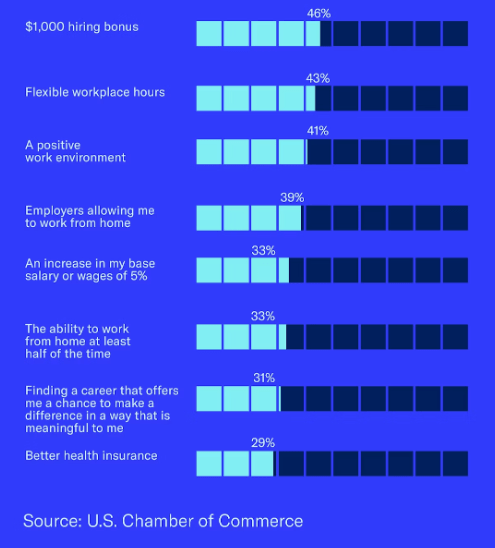
Employee turnover rates are on the rise, with studies indicating that approximately 32 percent of workers end up changing careers. The majority do so because they want to shift to another field. There are many reasons why employees choose to change their career track. One of the greatest motivators was better salary and benefits. However, the current wave of career switchers is influenced by different priorities.
A survey found employees reassess what they seek in a career, emphasizing the importance of flexible scheduling and a positive workplace culture.

These factors have become as significant, if not more so, than the traditional motivators of money and benefits. Notably, a career change leads to employee turnover.
This turnover disrupts organizational continuity and impacts employee morale and company culture. High turnover rates are often linked to a mismatch between employee skills and job roles or a lack of career development opportunities. These issues highlight a pressing need for better career guidance within organizations.
Artificial intelligence (AI) is a potent tool to address these challenges.
How Artificial Intelligence Helps in Career Mapping
AI has increasingly become a transformative force in career development. It can provide personalized guidance and insights that help employees establish and advance their careers in several impactful ways.
Enhances skill assessment
AI-driven platforms can profoundly assess an individual’s skills and competencies by analyzing data from various sources. They can comb through past job performances, educational records, and even interactive assessments.
These platforms use machine learning algorithms to pinpoint strengths and weaknesses. Employees can use this information as a clear roadmap of what skills to improve or learn to achieve their career goals. This personalized feedback helps them reduce the time and resources spent on irrelevant training.
AI can suggest up-to-date training and certifications by keeping pace with industry demands. This ensures that employees remain competitive in their fields, aligning their skill sets with market needs and improving their pay grade.
For instance, project management certifications can boost salary by 20 percent.
Such targeted education recommendations help employees pivot their careers toward more promising opportunities, fostering job satisfaction and longevity in chosen fields.
Better career path guidance
AI tools assist in career planning by simulating various career paths and outcomes based on an individual’s profile and goals. These simulations can predict future job demands, possible promotions, and even changing skill requirements, allowing employees to visualize potential career trajectories. This foresight helps individuals make informed decisions about their professional growth, aligning their current actions with long-term objectives.
These tools offer personalized advice by comparing an individual’s career progress against industry benchmarks and similar professional profiles. Employees can understand where they stand in their career landscape, which is crucial for guiding them on what steps they might take to climb higher or transition into new roles or industries effectively.
Improves job matching technology
AI-driven job-matching technologies enhance job search processes by connecting employees with the most suitable job opportunities. AI algorithms can identify matches based on skills and experiences by analyzing resumes and job descriptions. Advanced AI algorithms can even assess cultural fit. This speeds up the job search process and increases the chance of a successful and fulfilling job placement.
Employees benefit from these advanced systems. They receive alerts for job openings that align precisely with their career aspirations and skill sets. This targeted approach reduces the frustration of sifting through irrelevant listings. It allows them to focus on opportunities that genuinely match their career trajectory.
For example, using AI, candidates seeking better salaries can identify which careers in public utilities offer the best pay.
Real-time learning recommendations
With the rise of e-learning platforms, AI has become crucial in suggesting customized learning opportunities in real-time. AI systems analyze an employee’s current projects, job role, and ongoing industry trends to recommend the most relevant courses. This tailored approach to career development ensures that talents are always equipped with the latest knowledge and skills. It also enhances their job performance and adaptability to new challenges.
Additionally, AI can identify skills gaps within an organization and recommend group training sessions or individual learning paths. This helps employees advance in their careers and aids organizations in maintaining a highly skilled workforce.
Provides networking opportunities
AI can optimize networking by suggesting relevant connections within professional networks like LinkedIn. By analyzing data from multiple profiles, AI identifies potential mentors, peers, or industry leaders with whom an employee might benefit from connecting. This facilitates more strategic networking focused on building meaningful relationships that can offer guidance, job opportunities, and collaborations.
AI-powered event recommendations can help employees find workshops, seminars, or conferences that align with their career goals. Attending these events can be crucial for professional growth. It can offer insights into industry trends and networking opportunities that might not be available within an individual’s immediate work environment.
Personalizes feedback and performance analysis
Ninety-six percent of employees have positive feelings about receiving regular feedback.

AI tools can deliver ongoing, personalized feedback by analyzing work patterns, project outcomes, and peer reviews. This constant stream of feedback helps employees understand their current performance, allowing for immediate improvements and adjustments. Such insights are crucial for personal development. Employees can focus on areas that have the most significant impact on their career advancement.
This technology enables managers to provide more objective, data-driven feedback, ensuring that evaluations are fair and based on concrete performance metrics. This can enhance the employee-manager relationship, leading to more effective mentoring and support tailored to the individual’s career needs.
Use of predictive analytics in career advancement
AI’s predictive capabilities can forecast industry trends and the future relevance of specific roles and skills. Employees can proactively adjust their career strategies to embrace emerging roles or upskill in anticipation of future demands. This forward-looking approach prevents professional stagnation and prepares individuals for changes within their fields.
Predictive analytics also help employees gauge the potential success of a career move. These analytics reduce the risk of such moves and provide security when venturing into new professional territories.
Adopt AI for Career Mapping
Implementing AI in career mapping is a strategic move that can significantly benefit employees and organizations. AI’s data-driven insights can offer personalized career guidance, fostering a more engaged workforce with lower turnover rates.
Employees gain an understanding of their career trajectory. They can develop skills and pursue roles that align with their goals and values. AI can be a transformative tool that builds a resilient, future-ready workforce that values growth, flexibility, and job satisfaction.






